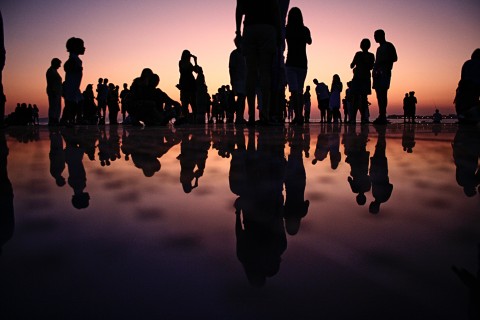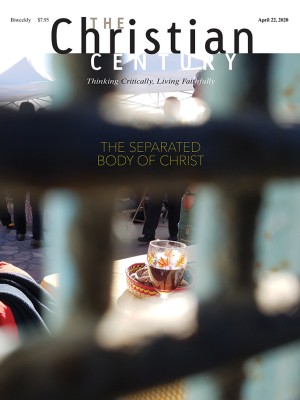On not getting used to this
My spiritual practices have long been communal ones. I love people—and their presence.

I am a pastor, and a failure at contemplative spiritual practices. The few meditation sessions I’ve attempted have devolved into list-making within minutes. One silent retreat led to existential navel-gazing. I suffer through silent, individual prayer— in it I find no joy.
Instead, my spiritual practices are material and communal. I bake bread for communion, kneading my way into a shared meal with the people who will eat the bread of life. I take walks, noticing the world given as a gift, with no other purpose than to be enjoyed and loved. I read books that unite me to beautiful, difficult, and complex thinkers who form a communion of saints.
Read our latest issue or browse back issues.
But mostly I love people. My spiritual practice is to hold space for the celebration and sorrow of people’s lives. I love the pitch of human laughter and the varying temperatures of palms pressed into mine. I love textures of skin, the complications of long relationships, the tone of voices woven together in song, the tracks of tears on skin.
Christianity produced an earthy, human set of texts by which we set our lives. In the Gospels Jesus pulls apart fish on a hillside. A woman breaks her best oil jar over his feet, massaging ointment into his worn soles. In another story, Jesus takes earth and his own spit, making holy mud that washes away the stigma of sin from a blind man. The Gospels are stories of bodies that hunger and long, fight and weep, rest and toil, drink and bleed. And the center of Christian worship is a meal in which we claim to ingest God, the body of Jesus becoming part of our bodies.
What do you do when people, your sustaining spiritual practice, are taken away?
In this strange new world marked by the coronavirus, I have continued my pastoral work. I’ve called each of my church’s households to offer a spiritual and emotional check-in for worried times. I’ve conducted online worship, preached to a camera, and gathered worship leaders to test singing on a streaming service. I’ve scheduled slots for digital pastoral care.
My colleagues have performed funerals open only to a few close family members standing six feet apart. There is no touching, no holding one another, no firm hold on a shaking shoulder to let the grieved know they do not bear this death alone. My chaplain friends speak to chronically ill and elderly patients through windows. Others are turned away from offering last rites at the beds of the dying.
I’ve tried my best to overcome solitude by attending Facebook concerts and operas. My children have connected with quarantined friends through cell phone play dates. We’ve doodled and danced before screens. But these are mere substitutes for a life I love, a people-d life. There is no replacement for humans.
I’ve thought that maybe now is the time I could reactivate personal spiritual disciplines with intense rigor and focus, attending to my “interior castle” with new zeal. But I’ve decided instead that I want to allow the longing for the physical world, for people, to grow. However long this strange season lasts, I am going to nurture my yearning for human life, for the rituals of food, water, and fire that require other humans to ignite.
Coronavirus snuck into our lives during the liturgical season of Lent, when Christians around the world spend 40 days in waiting, preparation, and expectation for Easter. On Easter Sunday the church enacts a yearly ritual of life being birthed from death. If we were to meet together, in the flesh of being the church we would celebrate Communion. There would be hugs and a shared lunch. We would proclaim a body risen from the dead with our bodies side by side.
This year my Lent may last longer. I anticipate that the absence of my spiritual practice of loving people in their bodies, just as they are, will continue to widen a space that cannot be filled with virtual access. Giving attention to the curve and shape of that empty place, being drawn back to longing for the lives that will fulfill it—this will be enough.







